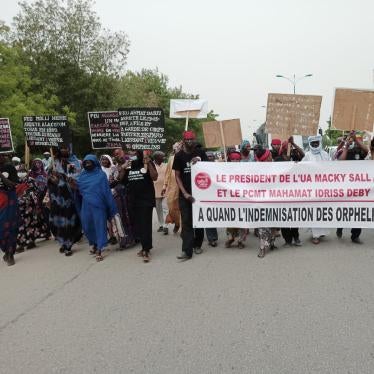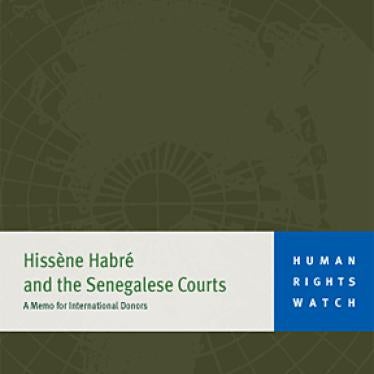(Nairobi)- As the African Union prepares to take up the case of Hissène Habré, thirty-five leading civil society groups from across Africa have urged A.U. leaders to recommend the extradition of the former Chadian dictator to Belgium, where he is wanted to face trial for crimes against humanity, or to arrange his prompt and fair trial in Africa.
The government of Senegal, where Habré has lived in impunity since 1990 when he was deposed by Chadian President Idriss Déby, on November 29, 2005 asked the African Union to decide which jurisdiction is competent to hold the former dictator’s trial. African leaders are due to consider the issue at the A.U. summit in Khartoum on January 23-24.
“Habré’s extradition would be a milestone in the fight to hold the perpetrators of atrocities accountable for their crimes,” said the African nongovernmental organizations.
The NGOs rejected the idea that Habré could only be tried in Africa, but said that if African leaders opposed his extradition to Europe, they had to propose a viable and speedy alternative in Africa.
“We all would have preferred to see Hissène Habré tried in Africa,” the NGOs, from twenty-one African countries, said in a letter to leaders of A.U. countries.
But the NGOs called attention to the fact that Senegal refused to prosecute Habré in 2000 when it had the opportunity to do so, while Chad has never sought Habré’s extradition (and could not guarantee him a fair trial), and no other country has asked for Habré’s extradition.
“If the African heads of state are reluctant to hand over Hissène Habré to Brussels for prosecution, then they ought to speedily propose a feasible mechanism which would lead to his prompt and fair trial in Africa,” said Jennifer Miano, the executive director of the Kenya Human Rights Commission. “The trial would not only ensure that the former dictator is held to account for his crimes but would further demonstrate Africa’s growing intolerance of impunity.”
“If the African Union says ‘no’ to Belgium, it must say ‘yes’ to Habré’s trial in Africa and provide a roadmap for that trial to take place,” said Reed Brody of Human Rights Watch, who coordinates the victims’ international campaign. “Habré’s victims have suffered too much and fought too long to find a court willing to listen to their torment to be ignored again.”
Among the signatories are the leading human rights groups in Chad, the Senegalese Coalition for the Extradition of Hissène Habré to Belgium, which includes the major groups in Senegal, and the Inter-African Union for Human Rights (IUHR) which itself brings together forty member NGOs working in different African countries.
“The African Union must choose justice, not impunity,” said Mr. Halidou Ouédraogo, president of the IUHR.
A copy of the letter from the NGOs is below.
Background
Hissène Habré ruled Chad from 1982 until 1990, when he was deposed by current President Idriss Déby and fled to Senegal. His one-party regime was marked by widespread atrocities. Habré periodically targeted various ethnic groups, killing and arresting group members en masse when he believed that their leaders posed a threat to his regime. Files of Hissène Habré’s political police, the DDS (Direction de la Documentation et de la Sécurité), discovered by Human Rights Watch in 2001, reveal the names of 1,208 persons who died in detention. A total of 12,321 victims of different abuses were mentioned. In these files alone, Hissène Habré received 1,265 direct communications from the DDS about the status of 898 detainees.
In February 2000, a Senegalese court charged Habré with torture and crimes against humanity and placed him under house arrest. But in March 2001, Senegal’s highest court said that Habré could not stand trial in Senegal for crimes allegedly committed elsewhere. Habré’s victims immediately announced that they would seek Habré’s extradition to Belgium, where twenty-one of Habré’s victims had filed suit. President Abdoulaye Wade of Senegal then stated that he would hold Hissène Habré in Senegal and that “if a country capable of organizing a fair trial—there is talk of Belgium—wants him, I do not foresee any obstacle.”
A four-year investigation by a Belgian judge resulted in an international arrest warrant against Habré on September 19, 2005 and his arrest in Senegal on November 15. On November 25, a Senegalese court said that it had no jurisdiction to rule on the extradition request. On November 27, Senegalese Foreign Minister Cheikh Tidiane Gadio said that it was “up to the African Union summit to indicate the jurisdiction which is competent to hear the case.” The summit is scheduled to be held in Khartoum on January 23-24.
NGO Letter
To the Heads of State of the African Union:
We, the undersigned African NGOs, urge that the African Union recommend to Senegal that it extradite the former Chadian dictator Hissène Habré to Belgium, where he is now wanted to stand trial on charges of crimes against humanity, war crimes, and torture. Senegal’s President Abdoulaye Wade has put the issue before the upcoming summit of the African Union.
The extradition of Mr. Habré to Belgium—which is supported by the government of Chad—would be a milestone in the fight to hold the perpetrators of atrocities accountable for their crimes.
Mr. Habré stands accused of atrocities committed on a massive scale. A Chadian Truth Commission estimated that Mr. Habré’s regime was responsible for the deaths of some 40,000 Chadians and the systematic practice of torture. Mr. Habré periodically targeted various ethnic groups such as the Sara (1983-6), the Arabs, the Hadjerai (1987), and the Zaghawa (1989-90), killing and arresting group members en masse. The files of Mr. Habré’s political police, the Documentation and Security Directorate (DDS), provide a meticulously detailed account of Mr. Habré’s repression. A total of 12,321 victims of abuse are mentioned in the documents, including 1,208 individuals who died in detention.
Some have argued against sending an African leader for trial in Europe. We all would have preferred to see Hissène Habré tried in Africa. But the fact is that Senegal refused to prosecute Mr. Habré in 2000 when it had the opportunity to do so, Chad has never sought Mr. Habré’s extradition (and could not guarantee him a fair trial), and no other country has asked for Mr. Habré’s extradition. Creation of a new African tribunal to try Mr. Habré’s alleged crimes is too distant, too contingent, and too costly.
Unless an African country with an independent judiciary having competence over the acts, that adheres to international fair trial standards and could arrange to incorporate the results of the four-year Belgian pre-trial investigation, were rapidly to seek Hissène Habré’s extradition, Mr. Habré’s extradition to Belgium remains the most concrete, realistic, and timely option for ensuring that he is able to respond to the charges against him with all guarantees of a fair trial.
Hissène Habré’s victims have already been waiting for fifteen years to find a court to hear their case, and many of the survivors have already died.
We urge the African Union to choose justice, not impunity, and to recommend Hissène Habré’s extradition to Belgium.
Yours sincerely,
The InterAfrican Union for Human Rights (IUHR)
The Chadian Association of Victims of Political Repression and Crime (AVCRP)
The Chadian Association for the Promotion and Defense of Human Rights (ATPDH)
The Chadian League for Human Rights (LTDH)
The Chadian Association for the Promotion of Fundamental Freedoms (APLFT)
Senegalese Coalition for the Extradition of Hissène Habré to Belgium
The African Assembly for the Defense of Human Rights (RADDHO)
The Senegalese Coalition of Human Rights Defenders
The League of the Rights of the Person in the Great Lakes
The Association for Human and Social Development in Mauritania,
The Movement of Mauritanian Refugees in Sénégal for Human Rights
Groupe d’étude et de recherche sur la démocratie et le développement économique et social au Burkina (G.E.R.D.D.E.S.)
Amnesty International – Benin Section
Club Union Africaine (Côte d’Ivoire)
African Children’s Development (Côte d’Ivoire)
Ivorian Movement for Human Rights (MIDH)
Burkinabe Movement for Human and People’s Rights (MBDHP)
Network of Journalists for Human Rights (RJDH - Niger)
Fizi Women’s Solidarity for Family Well-Being (RDC)
Social Action for Peace and Development (ASPD -RDC)
Commission Diocésaine Justice et Paix (CDJP/Kalemie - RDC)
Arche d’Alliance (Association for the Promotion and Defense of the Human Person in the DRC).
Centre des droits de l'homme et du développement (CDHD – Congo Republic)
Mediterranean Organization for Development and Humanitarian Action (Morocco)
Djibouti League for Human Rights
SOS Aux Victimes de Non-Droit (Madagascar)
Center for Democratic Empowerment (CEDE -Liberia)
Hurinet—Uganda: Human Rights Network
National Society for Human Rights—Namibia
Media Institute of Southern Africa
SANGONET—South African NGO Network
Youth Development Forum—Uganda
Volia Basin Development Foundation (Ghana)
Inter African Network for Women, Media, Gender and Development
Kenya Human Rights Commission







